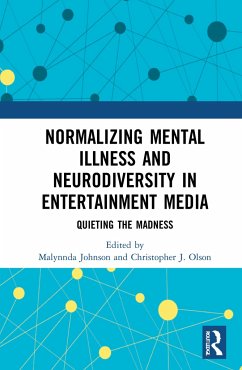Normalizing Mental Illness and Neurodiversity in Entertainment Media
Quieting the Madness
Herausgeber: Johnson, Malynnda; Olson, Christopher J.
Normalizing Mental Illness and Neurodiversity in Entertainment Media
Quieting the Madness
Herausgeber: Johnson, Malynnda; Olson, Christopher J.
- Gebundenes Buch
- Merkliste
- Auf die Merkliste
- Bewerten Bewerten
- Teilen
- Produkt teilen
- Produkterinnerung
- Produkterinnerung
This volume examines the shift towards positive and more accurate portrayals of mental illness in entertainment media, asking where these succeed and considering where more needs to be done.
Andere Kunden interessierten sich auch für
![Normalizing Mental Illness and Neurodiversity in Entertainment Media Normalizing Mental Illness and Neurodiversity in Entertainment Media]() Normalizing Mental Illness and Neurodiversity in Entertainment Media40,99 €
Normalizing Mental Illness and Neurodiversity in Entertainment Media40,99 €![Literary Representations of Pandemics, Epidemics and Pestilence Literary Representations of Pandemics, Epidemics and Pestilence]() Literary Representations of Pandemics, Epidemics and Pestilence40,99 €
Literary Representations of Pandemics, Epidemics and Pestilence40,99 €![Building Children's Resilience in the Face of Parental Mental Illness Building Children's Resilience in the Face of Parental Mental Illness]() Building Children's Resilience in the Face of Parental Mental Illness32,99 €
Building Children's Resilience in the Face of Parental Mental Illness32,99 €![Supporting Autism and Social Communication Difficulties in Mainstream Schools Supporting Autism and Social Communication Difficulties in Mainstream Schools]() Plum HuttonSupporting Autism and Social Communication Difficulties in Mainstream Schools27,99 €
Plum HuttonSupporting Autism and Social Communication Difficulties in Mainstream Schools27,99 €![Psychiatric Mental Health Assessment and Diagnosis of Adults for Advanced Practice Mental Health Nurses Psychiatric Mental Health Assessment and Diagnosis of Adults for Advanced Practice Mental Health Nurses]() Kunsook S. BernsteinPsychiatric Mental Health Assessment and Diagnosis of Adults for Advanced Practice Mental Health Nurses42,99 €
Kunsook S. BernsteinPsychiatric Mental Health Assessment and Diagnosis of Adults for Advanced Practice Mental Health Nurses42,99 €![Neurodiversity-Affirming Psychotherapy Neurodiversity-Affirming Psychotherapy]() Ruth M. StrunzNeurodiversity-Affirming Psychotherapy45,99 €
Ruth M. StrunzNeurodiversity-Affirming Psychotherapy45,99 €![Broadcast News in the Digital Age Broadcast News in the Digital Age]() Faith SidlowBroadcast News in the Digital Age199,99 €
Faith SidlowBroadcast News in the Digital Age199,99 €-
-
-
This volume examines the shift towards positive and more accurate portrayals of mental illness in entertainment media, asking where these succeed and considering where more needs to be done.
Hinweis: Dieser Artikel kann nur an eine deutsche Lieferadresse ausgeliefert werden.
Hinweis: Dieser Artikel kann nur an eine deutsche Lieferadresse ausgeliefert werden.
Produktdetails
- Produktdetails
- Verlag: Taylor & Francis Ltd
- Seitenzahl: 234
- Erscheinungstermin: 20. April 2021
- Englisch
- Abmessung: 240mm x 161mm x 17mm
- Gewicht: 494g
- ISBN-13: 9780367820527
- ISBN-10: 0367820528
- Artikelnr.: 61605482
- Herstellerkennzeichnung
- Libri GmbH
- Europaallee 1
- 36244 Bad Hersfeld
- gpsr@libri.de
- Verlag: Taylor & Francis Ltd
- Seitenzahl: 234
- Erscheinungstermin: 20. April 2021
- Englisch
- Abmessung: 240mm x 161mm x 17mm
- Gewicht: 494g
- ISBN-13: 9780367820527
- ISBN-10: 0367820528
- Artikelnr.: 61605482
- Herstellerkennzeichnung
- Libri GmbH
- Europaallee 1
- 36244 Bad Hersfeld
- gpsr@libri.de
Malynnda Johnson is an assistant professor of Communication at Indiana State University, USA, and the author of HIV on TV: Popular Culture's Epidemic. Christopher J. Olson is completing his doctoral research at the University of Wisconsin-Milwaukee, USA. He is the co-author of Possessed Women, Haunted States: Cultural Tensions in Exorcism Cinema and the co-editor of Making Sense of Cinema: Empirical Studies into Film Spectators and Spectatorship; Heroes, Heroines, and Everything in Between: Challenging Gender and Sexuality Stereotypes in Children's Entertainment Media; and Convergent Wrestling: Participatory Culture, Transmedia Storytelling, and Intertextuality in the Squared Circle.
1. Introduction: Why depictions of mental illness matter 2."Remember what
Dr. Lopez said": Portrayals of mental health care in Nickelodeon's The Loud
House 3."And I suffer from short-term memory loss": Understanding
presentations of mental health in Pixar's Finding Nemo and Finding Dory
through communication theory of identity 4.Family narratives and mental
illness in This is Us 5.Cognitive differences in Star Trek: The case and
evolution of Reginald Barclay 6.Popular culture and the (mis)representation
of Asperger's: A study on the sitcoms Community and The Big Bang Theory 7.
Psychopath, Sociopath, or Autistic: Labeling and framing the brilliance of
Sherlock Holmes 8.When Saga Norén meets neurotypicality: A liminal
encounter along The Bridge 9.The Girl on the Swing: An analysis of cues and
depression in Joe Wright's Pride and Prejudice (2005) 10.Depictions of
depression and eating disorders in My Mad Fat Diary 11."Portraying real
feelings with comedy on top": Postpartum depression storylines and domestic
sitcoms 12.Ruby Wax: Comedy, celebrity capital, and (re)presentations of
mental illness 13.Post-traumatic stress disorder in the films Taxi Driver
and You Were Never Really Here: A comparative progressive approach 14.
Bipolar and Shameless: Showtime's portrayal of living and working with
bipolar disorder 15.Wrestling with eating disorders: Transmedia depictions
of body issues in WWE's women's professional wrestling 16.Conclusion:
Destigmatizing mental illness and neurodiversity in entertainment media
Dr. Lopez said": Portrayals of mental health care in Nickelodeon's The Loud
House 3."And I suffer from short-term memory loss": Understanding
presentations of mental health in Pixar's Finding Nemo and Finding Dory
through communication theory of identity 4.Family narratives and mental
illness in This is Us 5.Cognitive differences in Star Trek: The case and
evolution of Reginald Barclay 6.Popular culture and the (mis)representation
of Asperger's: A study on the sitcoms Community and The Big Bang Theory 7.
Psychopath, Sociopath, or Autistic: Labeling and framing the brilliance of
Sherlock Holmes 8.When Saga Norén meets neurotypicality: A liminal
encounter along The Bridge 9.The Girl on the Swing: An analysis of cues and
depression in Joe Wright's Pride and Prejudice (2005) 10.Depictions of
depression and eating disorders in My Mad Fat Diary 11."Portraying real
feelings with comedy on top": Postpartum depression storylines and domestic
sitcoms 12.Ruby Wax: Comedy, celebrity capital, and (re)presentations of
mental illness 13.Post-traumatic stress disorder in the films Taxi Driver
and You Were Never Really Here: A comparative progressive approach 14.
Bipolar and Shameless: Showtime's portrayal of living and working with
bipolar disorder 15.Wrestling with eating disorders: Transmedia depictions
of body issues in WWE's women's professional wrestling 16.Conclusion:
Destigmatizing mental illness and neurodiversity in entertainment media
1. Introduction: Why depictions of mental illness matter 2."Remember what
Dr. Lopez said": Portrayals of mental health care in Nickelodeon's The Loud
House 3."And I suffer from short-term memory loss": Understanding
presentations of mental health in Pixar's Finding Nemo and Finding Dory
through communication theory of identity 4.Family narratives and mental
illness in This is Us 5.Cognitive differences in Star Trek: The case and
evolution of Reginald Barclay 6.Popular culture and the (mis)representation
of Asperger's: A study on the sitcoms Community and The Big Bang Theory 7.
Psychopath, Sociopath, or Autistic: Labeling and framing the brilliance of
Sherlock Holmes 8.When Saga Norén meets neurotypicality: A liminal
encounter along The Bridge 9.The Girl on the Swing: An analysis of cues and
depression in Joe Wright's Pride and Prejudice (2005) 10.Depictions of
depression and eating disorders in My Mad Fat Diary 11."Portraying real
feelings with comedy on top": Postpartum depression storylines and domestic
sitcoms 12.Ruby Wax: Comedy, celebrity capital, and (re)presentations of
mental illness 13.Post-traumatic stress disorder in the films Taxi Driver
and You Were Never Really Here: A comparative progressive approach 14.
Bipolar and Shameless: Showtime's portrayal of living and working with
bipolar disorder 15.Wrestling with eating disorders: Transmedia depictions
of body issues in WWE's women's professional wrestling 16.Conclusion:
Destigmatizing mental illness and neurodiversity in entertainment media
Dr. Lopez said": Portrayals of mental health care in Nickelodeon's The Loud
House 3."And I suffer from short-term memory loss": Understanding
presentations of mental health in Pixar's Finding Nemo and Finding Dory
through communication theory of identity 4.Family narratives and mental
illness in This is Us 5.Cognitive differences in Star Trek: The case and
evolution of Reginald Barclay 6.Popular culture and the (mis)representation
of Asperger's: A study on the sitcoms Community and The Big Bang Theory 7.
Psychopath, Sociopath, or Autistic: Labeling and framing the brilliance of
Sherlock Holmes 8.When Saga Norén meets neurotypicality: A liminal
encounter along The Bridge 9.The Girl on the Swing: An analysis of cues and
depression in Joe Wright's Pride and Prejudice (2005) 10.Depictions of
depression and eating disorders in My Mad Fat Diary 11."Portraying real
feelings with comedy on top": Postpartum depression storylines and domestic
sitcoms 12.Ruby Wax: Comedy, celebrity capital, and (re)presentations of
mental illness 13.Post-traumatic stress disorder in the films Taxi Driver
and You Were Never Really Here: A comparative progressive approach 14.
Bipolar and Shameless: Showtime's portrayal of living and working with
bipolar disorder 15.Wrestling with eating disorders: Transmedia depictions
of body issues in WWE's women's professional wrestling 16.Conclusion:
Destigmatizing mental illness and neurodiversity in entertainment media








